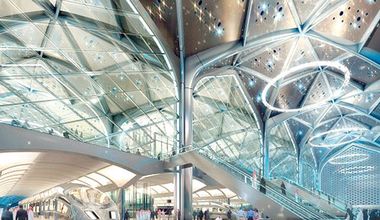
Makkah, April 9: The Haramain Railway’s main station in Makkah will cost SR3.2 billion, Transport Minister Jabara Al-Seraisry said yesterday after inspecting the progress of work at the station.
He said real estate property valued at more than SR600 million have been appropriated for the high-speed railway project linking the two holy cities of Makkah and Madinah via Jeddah.
The minister was given a presentation on the project and its various phases. “The project is progressing well in accordance with the plan, despite the difficulties in the land acquisition process,” he said.
“Our intention is to carry out this vital project without causing any harm to residents,” Al-Seraisry said.
The high-speed rail link will be completed in 2014 when passenger trains start running.
The main station in Makkah will be ready before that.
The minister said real estate owners would be given compensation for land and buildings if they posses valid deeds. “If they don’t have any deeds, the compensation will be only for the demolished buildings,” he added.
However, he emphasized all real estate owners would get suitable compensation. He said the ministry would ensure the project is of high quality.
Last month, Al-Seraisry inspected the railway station on King Abdul Aziz Street in Madinah.
Apart from the five stations originally planned for Jeddah city, King Abdul Aziz International Airport, King Abdullah Economic City in Rabigh, Makkah and Madinah, the railway will have an additional one at Abyar Ali in Madinah.
Crown Prince Naif, deputy premier and minister of interior, ordered Abyar Ali station because it is the location where many pilgrims change into their ihram before heading to Makkah for Haj or Umrah.
The government signed recently a SR30.815 billion contract with a Saudi-Spanish consortium for implementing Phase II of the project. When completed, the railway will represent a quantum leap in the Kingdom’s transport sector.
The final phase of the project include construction of railway tracks, installation of signals, telecommunications, electrification system, operational control center, procurement and manufacture of rolling stock, and maintenance of rolling stock and the entire infrastructure for a period of 12 years.
The Makkah-Madinah rail link is part of the major railway expansion project, which includes linking Jeddah with Riyadh and Dammam. The Haramain Railway is expected to carry more than 150,000 passengers daily during peak seasons, such as Haj and Umrah.





Comments
Add new comment